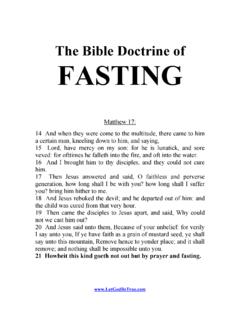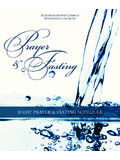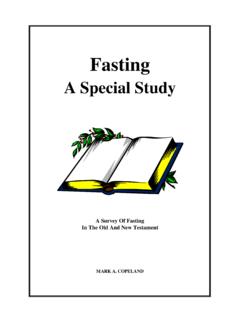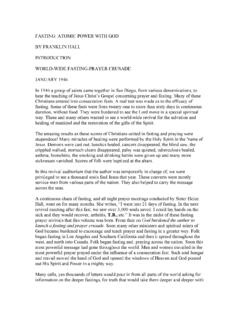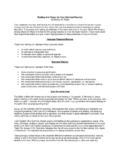Transcription of THERAPEUTIC FASTING
1 THERAPEUTIC . FASTING . BY ARNOLD DEVRIES. COPYRIGHT 1963 BY ARNOLD DE VRIES. All rights reserved. This book, or parts thereof, must not be reproduced in any form without permission. FOURTH EDITION. PRINTED IN THE UNITED STATES OF AMERICA. Published by Chandler Book Co., Box 75923, Los Angeles 5, California TABLE OF CONTENTS. I Forms of FASTING _____ 3. II A Short History of FASTING _____ 4. IlI Physiological Reactions to FASTING _____ 7. IV Efficiency of FASTING _____ 15. V The Complete Fast _____ 34. VI Safely of the Fast _____ 40.
2 VII Symptoms of the Fast _____ 45. VIII Supervising the Fast _____ 53. IX Breaking the Fast _____ 60. X Living after the Fast_____ 66. Bibliography _____ 74. 2. I Forms of FASTING THE TERM, FASTING , implies total or partial abstinence from food or water for any of a number of reasons. Thus one may refer to fruit fasts, vegetable fasts, milk fasts, water fasts and many other types. As the different reasons for FASTING are considered, other divisions may be given religious FASTING , professional FASTING , physiological FASTING , pathological FASTING and accidental or experimental FASTING .
3 A fruit fast is abstinence from fruit; a vegetable fast is abstinence from vegeta- bles; a milk fast is abstinence from milk; a water fast is abstinence from water, and similar fasts may be defined accordingly. Religious FASTING is abstinence to de- velop spiritual thought or fulfill a religious rite. Professional FASTING is abstinence for purposes of notoriety and publicity. Physiological FASTING is normal inanition in nature, such as the hibernation and seasonal abstinence of certain animals. Pathological FASTING is associated with organic derangements which make one un- able to take or retain food.
4 Accidental or experimental FASTING is forced inanition among man or animals for purposes of scientific investigation. These are the recognized forms of FASTING . Yet, there is another, and perhaps much more important, classification which is seldom given mention or even known about. This is THERAPEUTIC FASTING total abstinence from all food, but not water. The purpose of THERAPEUTIC FASTING is the promotion and restoration of health. It is associated with experimental and physiological FASTING in the sense that studies of the latter provide the knowledge and information which make THERAPEUTIC FASTING possible.
5 THERAPEUTIC FASTING is not the result of any particular new scientific discovery, 3. but rather has proceeded to its present development as the result of centuries of experimentation, observation and study. It is today the culmination of a large number of scientific investigations and discoveries which have reached their cli- max during the past century. FASTING for THERAPEUTIC purposes is thus an impor- tant, though in popular conception, almost unknown, phase of the modern science of medicine, and as such it is the subject of our present inquiry and analysis.
6 II A Short History of FASTING THE ORIGIN OF FASTING for illness perhaps dates back the development of the present forms of animal life. Among undomesticated animals it is a common practice to fast when ill, though this is of course an instinctive procedure rather than a planned THERAPEUTIC meas- ure. The first records of human FASTING for the remedy of disease go back to the ancient civilizations of Greece and the Near East. Both Plato and Socrates are said to have fasted for 10 days at a time to "attain mental and physical efficiency.
7 ". Pythagoras fasted for 40 days before taking his examination at the University of Alexandria, and then he also required his pupils to fast before they could enter his class. The ancient Egyptians were said to treat syphilis with their FASTING cures, and the great Greek physician, Hippocrates, prescribed FASTING during the critical periods of disease. Asclepiades and Thessalus employed FASTING ; Celsus is said to have used it in the treatment of jaundice and epilepsy, and the Arab physician, Avicenna, prescribed FASTING for three to five weeks at a time.
8 Later Tertullian wrote of FASTING , and Plutarch said: "Instead of using medicine better fast a day.". 4. During the sixteenth century, the renowned Swiss physician, Paracelsus claimed that, " FASTING is the greatest remedy." In the seventeenth century, Dr. Hoffman wrote a book entitled, Description of the Magnificent Results Obtained Through FASTING in All Diseases. Dr. Anton Nikolai followed in the next century with recommendations of FASTING instead of food for those who were ill. Later Dr. Von Seeland, of Russia, wrote: "As a result of experiments I have come to the conclusion that FASTING is not only a THERAPEUTIC of the highest degree possible but also deserves consideration educationally.
9 " In Germany, Dr. Adolph Mayer as- serted that " FASTING is the most efficient means of correcting any disease," and Dr. Moeller wrote that " FASTING is the only natural evolutionary method whereby through a systemic cleansing you can restore yourself by degrees to physiologic normality." It has been during the past century that the greater portion of scientific data has been gathered. Both Europe (in particular, Germany) and America have contributed heavily to the research on experimental and physiological FASTING .
10 Hundreds of publications have been the result of this work and they provide thor- ough and exact knowledge regarding many phases of FASTING . Among the best known research scientists who studied FASTING were: Sergius Morgulis, Professor of Biochemistry at the University of Nebraska College of Medicine; Professor Child, of the University of Chicago; Herbert Sidney Langfield, of Harvard Univer- sity; Dr. Frederick M. Allen, of the Rockefeller Institute; Francis Gano Benedict and Ernest G. Ritzman, of the Carnegie Institute; Luigi Luciani, Professor of Physiol- ogy at the University of Rome; and Victor Pashutin, Director of the Imperial Mili- tary Medical Academy of pre-revolutionary Russia.

